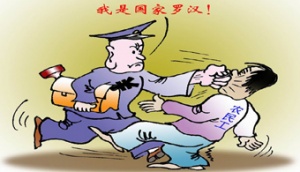“Nation's arhat (nation's gangster)”的版本间的差异
来自China Digital Space
小 (Anne moved page Nation’s arhat / nation’s gangster to Nation's arhat (nation's gangster)) |
|||
| 第1行: | 第1行: | ||
| − | + | <h3>''guó jiā luó hàn'' 国家罗汉</h3> | |
| − | In Buddhism, an arhat is one who has achieved nirvana and escaped the cycle of birth and rebirth. However, arhat, has an additional meaning in the Jiangxi dialect where it means “gangster.” The phrase, “the nation’s arhat” (ie., the nation’s gangster) comes from a labor dispute that occurred July 2008 in Fuzhou (抚州), Jiangxi. Lu Tao, an employee of the local court along with the foreman visited the construction site. In broad daylight they started beating a worker. The police arrived and tried to stop the violence. However, Lu Tao was not to be so easily deterred. As he was beating a worker he shouted, “I am from the court! I am the nation’s gangster!” | + | [[File:arhat.jpg|300px|thumb|right]]In Buddhism, an arhat is one who has achieved nirvana and escaped the cycle of birth and rebirth. However, arhat, has an additional meaning in the Jiangxi dialect where it means “gangster.” The phrase, “the nation’s arhat” (ie., the nation’s gangster) comes from a labor dispute that occurred July 2008 in Fuzhou (抚州), Jiangxi. Lu Tao, an employee of the local court along with the foreman visited the construction site. In broad daylight they started beating a worker. The police arrived and tried to stop the violence. However, Lu Tao was not to be so easily deterred. As he was beating a worker he shouted, “I am from the court! I am the nation’s gangster!” |
This event gave birth to the phrase, “the nation’s arhat/gangster.” The phrase can be used in the following ways: | This event gave birth to the phrase, “the nation’s arhat/gangster.” The phrase can be used in the following ways: | ||
| 第11行: | 第11行: | ||
(verb): “take care of” as in, “If you don’t straighten up then I’ll ‘nation’s gangster’ you.” | (verb): “take care of” as in, “If you don’t straighten up then I’ll ‘nation’s gangster’ you.” | ||
| − | + | [[Category:Grass-Mud Horse Lexicon]][[Category:Rule and Law]] | |
| − | |||
| − | |||
| − | |||
| − | |||
| − | |||
| − | |||
| − | |||
| − | |||
| − | |||
| − | |||
| − | |||
| − | |||
| − | |||
| − | [[ | ||
| − | |||
| − | [[Category: | ||
2016年3月11日 (五) 19:08的版本
guó jiā luó hàn 国家罗汉
In Buddhism, an arhat is one who has achieved nirvana and escaped the cycle of birth and rebirth. However, arhat, has an additional meaning in the Jiangxi dialect where it means “gangster.” The phrase, “the nation’s arhat” (ie., the nation’s gangster) comes from a labor dispute that occurred July 2008 in Fuzhou (抚州), Jiangxi. Lu Tao, an employee of the local court along with the foreman visited the construction site. In broad daylight they started beating a worker. The police arrived and tried to stop the violence. However, Lu Tao was not to be so easily deterred. As he was beating a worker he shouted, “I am from the court! I am the nation’s gangster!”
This event gave birth to the phrase, “the nation’s arhat/gangster.” The phrase can be used in the following ways:
(noun): A government employee who uses violence to intimidate people
(adjective): brutal and unreasonable
(verb): “take care of” as in, “If you don’t straighten up then I’ll ‘nation’s gangster’ you.”





